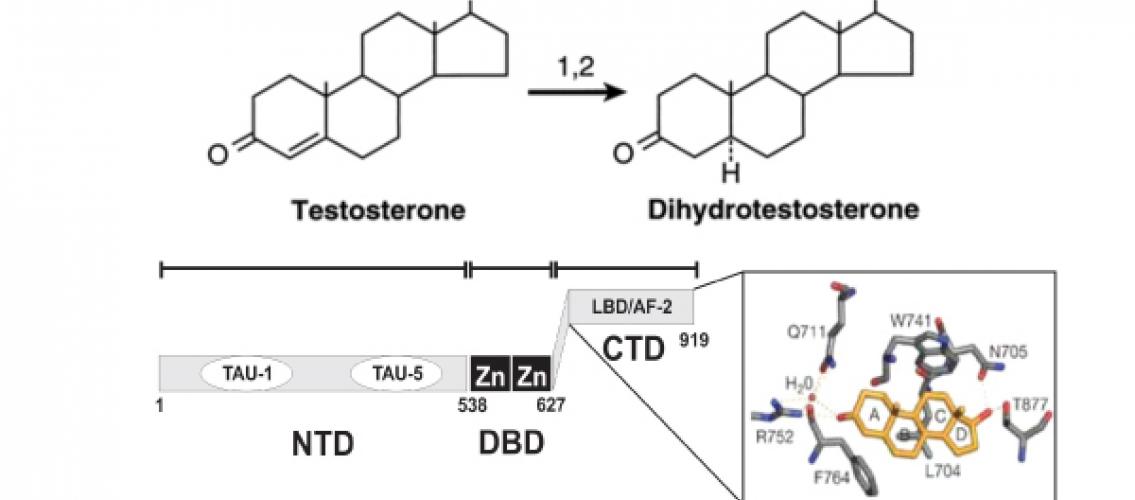
Among different types of cancers, prostate cancer has the highest incidence rate among men, and the second-highest death rate. In early stages of prostate cancer, radiation and surgical resection represent the standard of care, and often lead to good outcomes. In advanced cases, various forms of androgen depletion therapies can achieve effective control of the disease. This is because prostate cancer is hormone-dependent, wherein androgens (primarily testosterone and its derivates) fuel the growth of prostate cancer cells. Unfortunately, this only buys the patient some time, because androgen depletion eventually stops working and the cancer becomes resistant to treatment.
The research lab of Assistant Professor Scott Dehm (Masonic Cancer Center) has discovered a new molecular cause of therapeutic resistance - it arises due to the rearrangement of the Androgen Receptor in prostate cancer cells, resulting in the loss of the part of AR that binds androgens. The AR is a steroid hormone receptor transcription factor important for normal prostate function, as well as for the growth of prostate cancer.
Researchers in the Dehm lab are studying the AR using molecular, biochemical, cell biology, and genetic approaches. They are working with members of MSI’s RISS group to explore and characterize the rearrangements that occur in the 180kb Androgen Receptor (AR) locus in models of prostate cancer progression and in clinical tissues from prostate cancer patients. MSI has provided extensive CPU cycles and storage to enable the mapping and identification of structural changes in the genome.
This research has resulted in a recent paper that appeared in the Proceedings of the National Academy of Sciences of the USA. The paper, entitled “TALEN-engineered AR gene rearrangements reveal endocrine uncoupling of androgen receptor in prostate cancer” (M.D. Nyquist, Y. Li, T.H. Hwang, L.S. Manlove, R.L. Vessella, K.A.T. Silverstein, D.F. Voytas, S.M. Dehm, PNAS, 11(43):17492, DOI:10.1073/pnas.1308587110 (2013)), describes the discovery of AR gene rearrangements in prostate cancer tissues. It also discusses how the group uses genome engineering to classify the gene rearrangements as drivers of resistance. The researchers hope that this knowledge will help with the development of more effective prostate cancer treatment. (Note: M.D. Nyquist, Y. Li, and T.H. Hwang are MSI users in the Dehm group. D.F. Voytas is an MSI Principal Investigator from the Department of Genetics, Cell Biology, and Development. K.A.T. Silverstein is the MSI RISS Operations Manager and Scientific Lead.)
Other recent publications by the Dehm group that used MSI resources include:
- “Androgen Receptor Splice Variants Mediate Enzalutamide Resistance in Castration-Resistant Prostate Cancer Cell Lines,” Y.M. Li, S.C. Chan, L.J. Brand, T.H. Hwang, K.A.T. Silverstein, S.M. Dehm, Cancer Research, 73:483, DOI: 10.1158/0008-5472.CAN-12-3630 (2013)
- “AR Intragenic Deletions Linked to Androgen Receptor Splice Variant Expression and Activity in Models of Prostate Cancer Progression,” Y. Li, T.H. Hwang, L. Oseth, A. Hauge, R.L. Vessella, S.C. Schmechel, B. Hirsch, K.B. Beckman, K.A. Silverstein, S.M. Dehm, Oncogene, 31:4759-67 (2012)
- “Intragenic Rearrangement and Altered RNA Splicing of the Androgen Receptor in a Cell-Based Model of Prostate Cancer Progression,” Y. Li, M. Alsagabi, D. Fan, G.S. Bova, A.H. Tewfik, S.M. Dehm, Cancer Research, 71:2108-17 (2011)
Image Description: (Top): Structure of testosterone (left) and its derivate dihydrotestosterone. (Bottom): Dihydrotestosterone ligand interactions with the androgen receptor ligand-binding domain binding-pocket. Wild-type complex (gold), shown as a top view of the steroidal plane. The ligand and receptor interact mainly through H-bonds (dotted lines) and hydrophobic interactions. [bottom image adapted from Nat Clin Pract Endocrinol Metab, 2006 March; 2(3): 146-159, DOI: 10.1038/ncpendmet0120]
Posted on January 22, 2014.